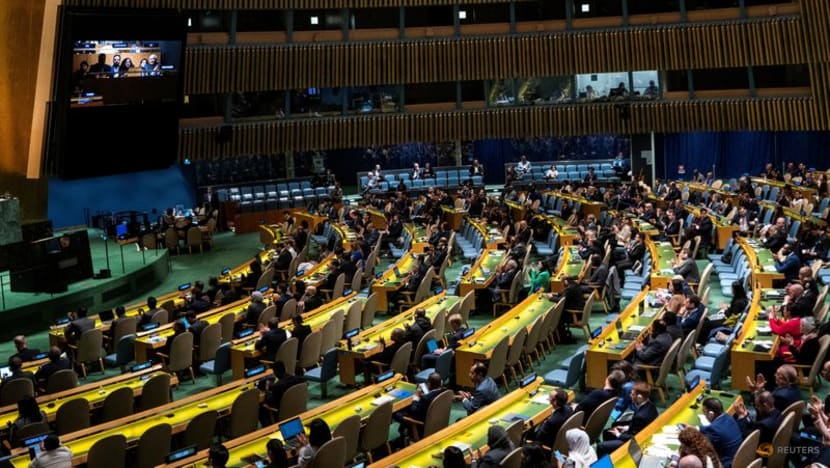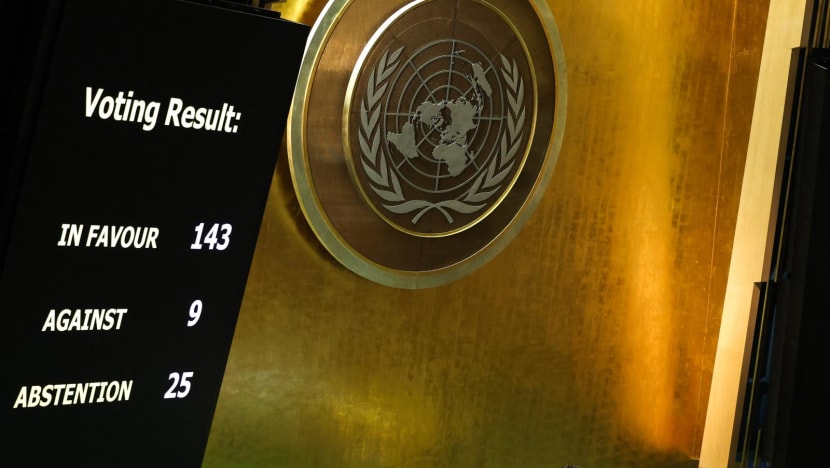Commentary: Why Singapore’s vote to support Palestine’s full membership in the UN matters
The United Nations General Assembly is the world’s voice on how international law should be interpreted and applied, says Joel Ng of S Rajaratnam School of International Studies.

Delegates react to the voting results during the United Nations General Assembly vote on a draft resolution that would recognize the Palestinians as qualified to become a full UN member, in New York City, US May 10, 2024. REUTERS/Eduardo Munoz

This audio is generated by an AI tool.
SINGAPORE: On Friday (May 10), Singapore joined 142 other countries in voting in favour of a resolution in the UN General Assembly (UNGA) supporting Palestine’s full membership in the organisation, which would elevate it from its present status as an observer.
Yet this will not immediately favour Palestine as this resolution was triggered by the United States’ veto of Palestine’s bid at the Security Council on Apr 18. So, some might dismiss the entire exercise as theatre, with nothing of consequence to show for it.
Was Singapore taking part in an exercise that was merely “symbolic” with no likelihood of success?

THE UN GENERAL ASSEMBLY’S POWERS
The UNGA is frequently characterised as making “symbolic” actions as its decisions do not have the legal force of the 15-member Security Council, on which permanent members such as the US sit.
Yet the UNGA does have several powers, particularly to make recommendations on the scope of the UN Charter. In other words, it plays a critical role in giving the world’s voice on how international law should be interpreted and applied.
One of the UNGA’s most effective acts was the criminalisation of Apartheid, the racist policies of the white South African regime against its black and ethnic minority populations.
In 1966, the UNGA declared Apartheid a crime against humanity. In 1973, it passed the Convention on the Suppression and Punishment of the Crime of Apartheid that elaborated how Apartheid violated international law. It entered into force in 1976, and the isolation of South Africa’s Apartheid regime finally led to its fall in 1994.
One might say such a process is very slow. This would not be wrong. But the act of persuading two fundamentally opposed sides to see it as being in their best interests to talk to each other and find a peaceful permanent resolution is an inherently gradual process.
The route to a lasting settlement in the Gaza conflict is also very different from the process that ended Apartheid.
UN MEMBERSHIP AND THE TWO-STATE SOLUTION
Singapore has reiterated that its vote in favour of Palestine’s membership is in support of the two-state solution, a position that enjoys global support and is mandated by past UN resolutions.
This would place the Palestinians on equal footing at the negotiating table. And it is important now because it appears that public support for a two-state solution has whittled in Israel and Palestine alike.
But consider the alternative. For either side to obtain an outcome that doesn’t share the land equitably, it involves the domination of the other. Resistance by the repressed side will be inevitable. Tragically, since Oct 7, 2023, both sides have given us demonstrable evidence of how this cycle of violence will continue.
Thus as Singapore Foreign Minister Vivian Balakrishnan stated, “Singapore’s vote reflects our heartfelt desire to see both parties resume direct face-to-face negotiations in good faith.”
The UNGA vote is part of a series of actions that have started the wheels turning against the most extreme elements of the Israel-Palestine divide. Its role in highlighting what international law has to say about the recent actions of the Israeli government and Hamas is important.
Observers abroad have questioned the legality of continued support for the Israeli government or Hamas. The UNGA’s positions on these matters will be influential, given its role in interpreting the UN Charter and international law.
PARALYSIS AT THE SECURITY COUNCIL
More generally, the UN Security Council has become increasingly stuck when it comes to decisions on international security because of renewed great power rivalry.
Before Gaza, Russia was vetoing resolutions relating to the war in Ukraine. The sobering thought is that as new conflicts break out, the Security Council has become increasingly paralysed, even as its actions are needed more than ever.
Many other conflicts - which have flared since the ebbing of the COVID-19 pandemic - have barely received adequate global attention or response.
Some may think that the UN has become irrelevant, and it is time for states to take unilateral actions. This would be the worst possible outcome from the deadlocks, especially for small countries like Singapore. A world where the mighty do not need to be held accountable is one where small states will suffer.
In recognising the problems at the UN, it is important to realise that it is not the Security Council that is unwilling to move, but specific individual states within. They need to be called out if the actions they take are antithetical to peace. The UNGA is the most legitimate option for countries to express abhorrence and propose how to go forward.
Collective action at the multilateral level must remain the main course of action if international order is to be maintained and be relevant for peaceful co-existence.
This is why the vote on Palestine’s membership is so important: As hardline elements in both sides try to take matters into their own hands, the world needs to support those who would find a peaceful solution.
Dr Joel Ng is Deputy Head of the Centre for Multilateralism Studies, S Rajaratnam School of International Studies, Nanyang Technological University, Singapore.


















